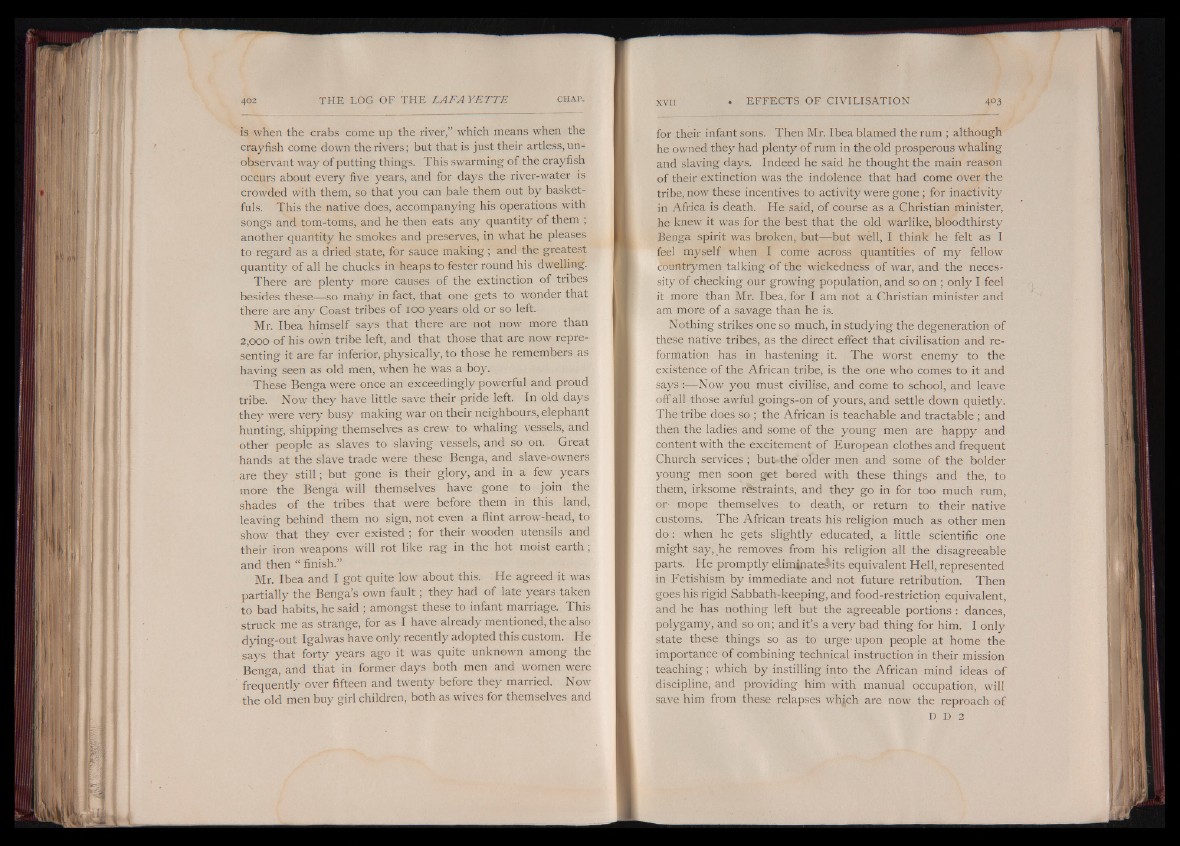
is when the crabs come up the river,” which means when the
crayfish come down the rivers; but that is just their artless, unobservant
way of putting things. This swarming of the crayfish
occurs about every five years, and for days the river-water is
crowded with them, so that you can bale them out by basketfuls.
This the native does, accompanying his operations with
songs and tom-toms, and he then eats any quantity of them ;
another quantity he smokes and preserves, in what he pleases
to regard as a dried state, for sauce making; and the greatest
quantity of all he chucks in heaps to fester round his dwelling.
There are plenty more causes of the extinction of tribes
besides these— so many in fact, that one gets to wonder that
there are any Coast tribes of 100 years old or so left.
Mr. Ibea himself says that there are not now more than
2,000 of his own tribe left, and that those that are now representing
it are far inferior, physically, to those he remembers as
having seen as old men, when he was a boy. .
These Benga were once an exceedingly powerful and proud
tribe. Now they have little save their pride left. In old days
they were very busy making war on their neighbours, elephant
hunting, shipping themselves as crew to whaling vessels, and
other people as slaves to slaving vessels, and so on. Great
hands at the slave trade were these Benga, and slave-owners
are they s till; but gone is their glory, and in a few years
more the Benga will themselves have gone to join the
shades of the tribes that were before them in this land,
leaving behind them no sign, not even a flint arrow-head, to
show that they ever existed ; for their wooden utensils and
their iron weapons will rot like rag in the hot moist earth;
and then “ finish.”
Mr. Ibea and I got quite low about this. He agreed it was
partially the Benga’s own fault; they had of late years taken
to bad habits, he said ; amongst these to infant marriage. This
struck me as strange, for as I have already mentioned, the also
dying-out Igalwas have only recently adopted this custom. He
says that forty years ago it was quite unknown among the
Benga, and that in former days both men and women were
frequently over fifteen and twenty before they married. Now
the old men buy girl children, both as wives for themselves and
for their infant sons. Then Mr. Ibea blamed the rum ; although
he owned they had plenty of rum in the old prosperous whaling
and slaving days. Indeed he said he thought the main reason
of their extinction was the indolence that had come over the
tribe, now these incentives to activity were gone; for inactivity
in Africa is death. He said, of course as a Christian minister,
he knew it was for the best that the old warlike, bloodthirsty
Benga spirit was broken, but— but well, I think he felt as I
feel myself when I come across quantities of my fellow
countrymen talking of the wickedness of war, and the necessity
of checking our growing population, and so on ; only I feel
it more than Mr. Ibea, for I am not a Christian minister and
am more of a savage than he is.
Nothing strikes one so much, in studying the degeneration of
these native tribes, as the direct effect that civilisation and reformation
has in hastening it. The worst enemy to the
existence of the African tribe, is the one who comes to it and
says p—Now you must civilise, and come to school, and leave
off all those awful goings-on of yours, and settle down quietly.
The tribe does so ; the African is teachable and tractable ; and
then the ladies and some of the young men are happy and
content with the excitement of European clothes and frequent
Church services; bufc. the older men and some of the bolder
young men soon get bored with these things and the, to
them, irksome restraints, and they go in for too much rum,
or mope themselves to death, or return to their native
customs. The African treats his religion much as other men
do: when he gets slightly educated, a little scientific one
might say, he removes from his religion all the disagreeable
parts. He promptly eliminate^its equivalent Hell, represented
in Fetishism by immediate and not future retribution. Then
goes his rigid Sabbath-keeping, and food-restriction equivalent,
and he has nothing left but the agreeable portions : dances,
polygamy, and so on; and it’s a very bad thing for him. I only
state these things so as to urge upon people at home the
importance of combining technical instruction in their mission
teaching ; which by instilling into the African mind ideas o f
discipline, and providing him with manual occupation, will
save him from these relapses whjch are now the reproach of
D D 2